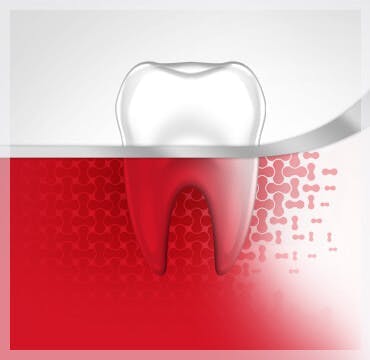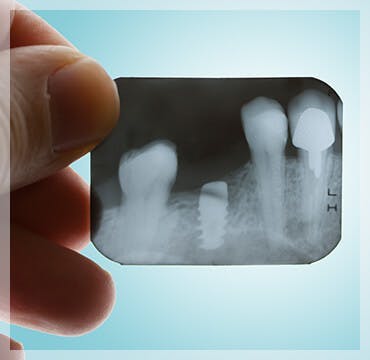Noticing blood in the sink after brushing your teeth or finding traces of blood on your dental floss is not normal. It could be an early sign of gum disease – gingivitis – and a warning that your gums need treatment.i Bleeding gums should never be ignored in the hope that the problem will just go away.
If your gums bleed when flossing or brushing and you're wondering how to stop it, take action straightaway. The good news is, by removing the causes of bleeding gums and following a good oral hygiene plan, you can help to reverse the condition – and reduce your chances of getting it in the first place.i
Bleeding gums is a complex oral health issue. Always consult your dentist about the best way to treat bleeding gums. parodontax is a gum-healthy toothpaste proven to help control bleeding gums symptoms.
What Causes Bleeding Gums?
You may be asking 'why are my gums bleeding?'. The main cause of bleeding gums is plaque – a sticky, transparent coating of bacteria that constantly builds up around, on and between your teeth. If plaque is not removed on a daily basis with regular brushing and flossing, it may progress to gingivitis – leading to gum irritation, redness, inflammation and bleeding.i, ii
Other factors can put you at risk of gums bleeding, including a genetic predisposition to gum disease, hormonal fluctuations during pregnancy or menopause, health conditions such as diabetes, rheumatoid arthritis, Chron’s disease or HIV/AIDs, or taking certain medications.ii
How to Stop Bleeding Gums
Regardless of what you think might be the cause of your bleeding gums, the best thing to do is speak to your dentist as soon as possible. Your dentist can diagnose your symptoms and identify the cause of your bleeding gums.
As bleeding gums are usually caused by ineffective oral hygiene, knowing how to stop bleeding gums is important. Improving your brushing and flossing habits and ensuring you are cleaning your teeth twice daily can help to reverse the condition.i
Improve Your Brushing Technique
Experts recommend we brush for two minutes twice daily with a soft-bristled toothbrush, paying special attention to clean all surfaces of your teeth. This is the first simple step to removing plaque and food debris that can lead to bleeding gums.iii, iv
Use a Toothpaste for Bleeding Gums
Choose a toothpaste that has been specifically developed to help prevent bleeding gums. parodontax toothpaste is clinically proven to help reduce the buildup of plaque, making it 3x more effective at removing plaque.*
*Compared to a sodium monofluorophosphate toothpaste after a professional cleaning and twice daily brushing.
Daily Flossing
Floss daily to remove plaque and food debris from between teeth and along the gum line that your toothbrush may have trouble reaching.iv
Visit the Dentist
Make regular dental appointments so your dentist can spot any problems before they become more serious. How often you need to visit the dentist will depend on your level of oral health, so speak to them about when to schedule your next appointment.
Quit Smoking
Not only does smoking double your risk of gum disease, but gum disease progresses faster in smokers than non-smokers. Smoking can also cause a lack of oxygen in the bloodstream, making it more difficult for your gums to heal from any damage caused by gum disease. What’s more, treatments for gum disease might not work as effectively for smokers as they do for non-smokers.v, vi
Eating a Gum-Healthy Diet
Most of us are aware that we should avoid sugary food and drinks, which can contribute to tooth decay – but eating a balanced, healthy diet can help keep our gums in great condition too.vii
A fibre-rich diet of fruits and veggies can help to keep your gums and teeth clean and improve the flow of saliva – the mouth’s first line of defense against bacteria and plaque buildup.vii You should also opt for vitamin C-rich foods such as oranges, broccoli, brussels sprouts and peppers, as a deficiency in this vitamin can increase your risk of developing gum disease.ii, viii
Reduce Your Stress Levels
It’s difficult to avoid stress, but too much of it could contribute to your risk of developing gum disease. Research has found that not only is psychological stress a risk factor for periodontal disease, but it can also potentially increase its severity.ix
How to Stop Bleeding Gums – Next Steps
Knowing how to stop bleeding gums can help prevent gum disease and future tooth loss. Good dental hygiene – including regular visits to your dentist and brushing your teeth twice a day with parodontax toothpaste – can help prevent further problems from developing.
SOURCES
By clicking any of the links below you will be taken to an external website that is independently operated and not managed by GSK. GSK assumes no responsibility for the content on the website. If you do not wish to leave this website, do not click on the links below.
- Gingivitis (Symptoms & causes). Mayo Clinic. https://www.mayoclinic.org/diseases-conditions/gingivitis/symptoms-causes/syc-20354453. Accessed 04/03/20.
- Periodontitis (Symptoms & causes). Mayo Clinic. https://www.mayoclinic.org/diseases-conditions/periodontitis/symptoms-causes/syc-20354473. Accessed 20/12/19.
- Brushing Your Teeth. Mouth Healthy. https://www.mouthhealthy.org/en/az-topics/b/brushing-your-teeth. Accessed 04/03/20.
- Preventing Periodontal Disease. American Academy of Periodontology. https://www.perio.org/consumer/prevent-gum-disease. Accessed 20/12/19.
- Smoking and oral health. Oral Health Foundation. https://www.dentalhealth.org/smoking-and-oral-health. Accessed 06/25/19.
- Smoking, Gum Disease, and Tooth Loss. Centers for Disease Control and Prevention. https://www.cdc.gov/tobacco/campaign/tips/diseases/periodontal-gum-disease.html. Accessed 06/25/19.
- The Best and Worst Foods for your Teeth. University of Rochester Medical Center. https://www.urmc.rochester.edu/encyclopedia/content.aspx?ContentTypeID=1&ContentID=4062. Accessed 04/03/20.
- Vitamin C. NHS. https://www.nhs.uk/conditions/vitamins-and-minerals/vitamin-c/. Accessed 04/03/20.
- Impact of chronic stress on periodontal health. Journal of Oral Medicine and Oral Surgery, 2018. https://www.jomos.org/articles/mbcb/pdf/2018/01/mbcb160058.pdf . Accessed 04/03/20.






